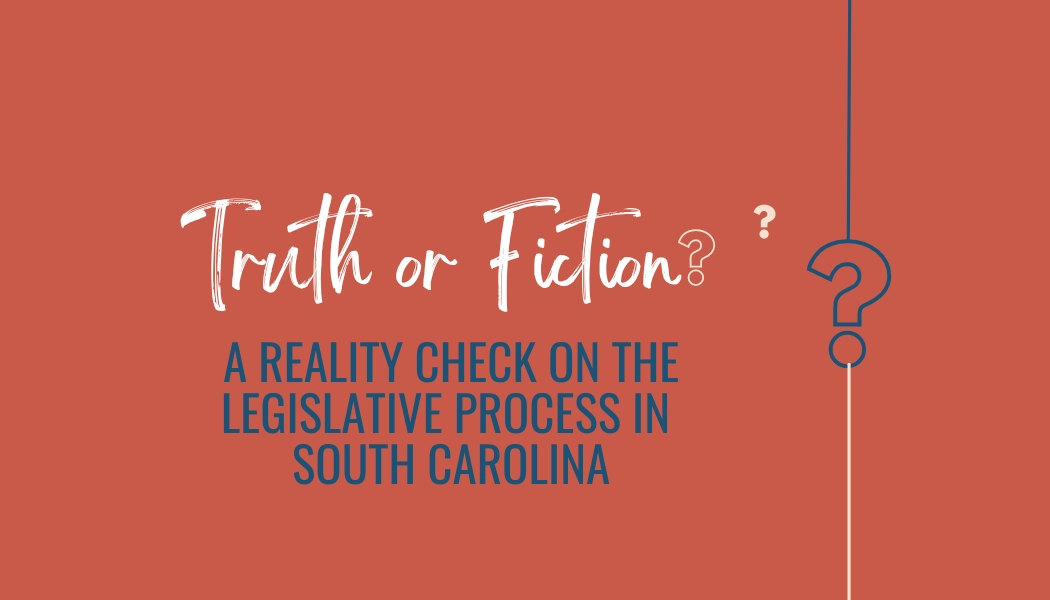
Oh, South Carolina, a land where the sweet tea flows like water and the magnolia blossoms, paint a picture of idyllic Southern charm. But beneath the palmetto trees and the mint julep sipping lies a legislative process that's not as picturesque as it seems. Today, we're swapping our sunhats for investigator caps as we delve into the reality versus the fiction of South Carolina's legislative process.
The Legislative Cast: It's Not Just About the People
South Carolina's legislative system appears to be a reflection of the federal structure, with a bicameral legislature comprising the Senate and the House of Representatives. It's a comforting idea - our neighbors representing us at the State House, making decisions for the good of the state. But let's take off our rose-colored glasses for a moment.
While it's true that we elect our 46 Senators and 124 Representatives, the question is, how much power do we, the people, truly wield? The political landscape often seems more like a game of chess played by party bigwigs rather than a forum for the voice of the people.
From Idea to Bill: A Less-Than-Perfect Transformation
Every law begins as an idea, an initiative, a spark. But once this spark enters the legislative machine, it undergoes a transformation. It's drafted into a bill, introduced to one of the houses, and then sent to a committee. Here's where things get interesting.
These committees, often referred to as 'book clubs' where bills are debated and amended, are frequently where good ideas go to die. The fate of the bill, no matter how beneficial it might be for the public, often hinges on the whims and fancies of committee members.
It is also the breeding ground for special interest groups and/or corporate lobbyists to impose their self-interests, which typically do not align with the public's. These special interest groups make it their full-time job to protect and enhance the profits for their clients. Most SC legislators, who are small business owners, can't even compete as they can only devote a fraction of their time to State House politics. In fact, State Representatives and Senators are only in session for 6 months. Unfortunately, our SC legislators have to rely on these special interest groups to educate them on bills, which is like placing the wolf in charge of the hen house. Consequently, citizens lose out at all levels unless a few conservative activists can overcome the intense wave of influence exerted by the special interest groups, who possess the time, money, experience, and connections to prevail in most situations.
The Great Debate: A Potluck of Opinions?
Once the committee gives the green light, the bill enters the stage for a floor debate. It's often imagined as a lively potluck where every opinion matters. But the reality? It's more akin to a highly orchestrated drama where the prominence of special interests often steals the spotlight, overshadowing the true merits of the bill itself.
The Governor's Seal: The Final Hurdle
If the bill manages to survive both the houses, it lands on the Governor's desk. But the Governor's role isn't just about giving a thumbs up or thumbs down. The power to veto can be used as a political tool, a fact often glossed over in the narrative of the legislative process.
The process might seem elaborate, designed to ensure every law passed is thoroughly vetted. But it's worth asking: is this truly a process in line with a republic, or is it merely a well-crafted performance? Behind the façade of Southern charm, it's crucial to recognize the game of power that's at play.
The legislative process in South Carolina isn't just about sweet tea and magnolia trees. It's about questioning, understanding, and most importantly, recognizing the gap between fiction and reality. The next time you enjoy that South Carolina sunshine, remember the often overlooked truth of our legislative process - it's not as simple as it seems. Let's strive for a system where the will of the people is not just a comforting narrative, but a tangible reality.




Comments